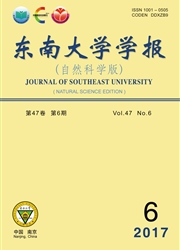

 中文摘要:
中文摘要:
针对固定正交基下语音信号稀疏化程度低、适应性差的问题,提出了一种自适应的语音稀疏化方法,并将其应用到语音压缩感知理论中.该方法首先采用线性预测系数的加权线性组合对语音信号进行线性预测,并以线性预测残差基作为信号基.然后,按照稀疏约束条件训练出稀疏表示的过完备字典,并交替应用1-范数稀疏约束的追踪和奇异值分解算法,达到字典与稀疏系数同步更新.该方法从信号特征入手,学习并提取特征或纹理信息,能较好地实现语音信号的稀疏化,提高语音压缩感知的重构性能.实验结果显示,与其他正交基方法相比,该方法的语音稀疏化程度高.语音质量的主客观评价结果显示,该方法具有良好的重构性能.
 英文摘要:
英文摘要:
To overcome the problem that the method of sparsification for speech signal based on fixed orthogonal base has a low sparsity and is not adaptive,a new adaptive sparsification algorithm is developed for speech signal compression.First,speech signal is predicted by linear predication using weighted linear combination of linear predictive coefficients,and the linear prediction residual are used as the signal bases.Then,the adaptive training dictionary is trained under the sparsity constraint,and the dictionary and sparsity coefficients are updated by alternatively using 1-norm sparsity constraint pursuit and singular value decomposition(SVD) algorithm.By analyzing the feature of speech signals,the new scheme can exactly extract essential feature or texture feature,and can obtain better sparsification performance and reconstruction performance for speech signal.The experimental results show that compared with other orthogonal base algorithms,the sparsity of speech signals with the proposed method is obviously improved.The subjective and objective evaluation results of speech quality also show that the proposed method exhibits a good reconstruction performance in speech signal.
 同期刊论文项目
同期刊论文项目
 同项目期刊论文
同项目期刊论文
 Blind Multiple Access Interference Suppression Algorithm Based on Relaxed Subgradient Projection for
Blind Multiple Access Interference Suppression Algorithm Based on Relaxed Subgradient Projection for Two-dimensional canonical correlation analysis and its application in small sample size face recogni
Two-dimensional canonical correlation analysis and its application in small sample size face recogni 期刊信息
期刊信息
